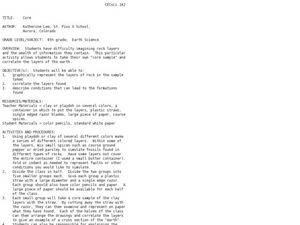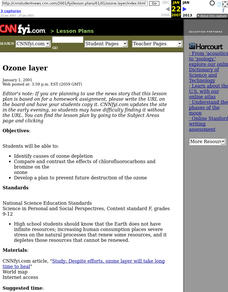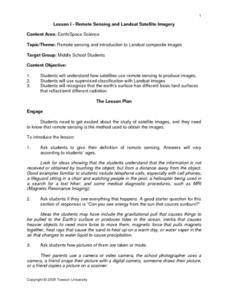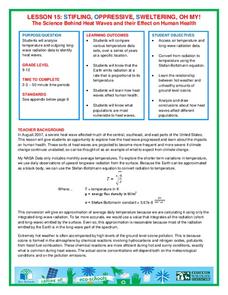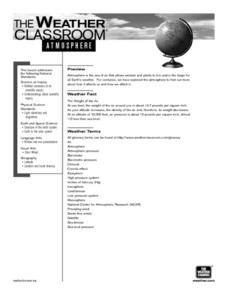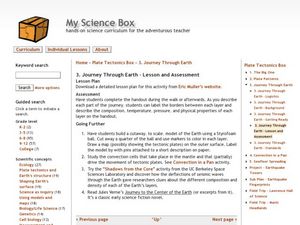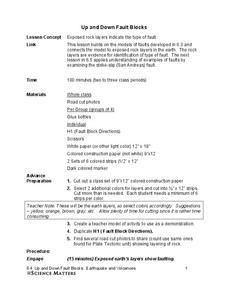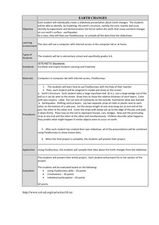Curated OER
Core
Eighth graders take their own "core sample" with clay and/or play-dough and correlate the layers of the earth.
Curated OER
Ozone Layer
Students read a CNNfyi.com article in order to identify causes of ozone depletion. They compare and contrast the effects of chlorofluorocarbons and bromine on the ozone. They develop a plan to prevent future destruction of the ozone.
Curated OER
Remote Sensing and Landsat Satellite Imagery
Learners comprehend how satellites use remote sensing to produce images. They use supervised classification with Landsat images. Students recognize that the earth's surface has different basic land surfaces that reflect/emit different...
Curated OER
So Much Water, So Little to Drink
Students explore salt and fresh water. In this water lesson plan, students investigate the amount of Earth covered by water. Students compare the amounts of salt water to fresh water. Students create a visual representation to aid...
Curated OER
Power On to Present- What You Know About Where You Went
Third graders write an essay. In this earth's layers lesson plan, 3rd graders view a power point presentation on layers of the earth and discuss it. They write a short essay on the layers and their characteristics. They use Microsoft...
Curated OER
Ozone: The Earth's Security Blanket
Young scholars work in groups to define and research the terms: ozone, troposphere and stratosphere. Students watch videos, conduct Internet research, participate in discussion groups and complete worksheets.
National Wildlife Federation
Stifling, Oppressive, Sweltering, Oh My!
Looking for a hot date? Pick any day in August, statistically the hottest month in the United States. The 15th lesson in the series of 21 instructs pupils to investigate the August 2007 heat wave through NASA data, daily temperature...
Curated OER
Structure of the Earth
Sixth graders examine the layers of the Earth and the changes that take place on a daily basis. They look at the layers of a boiled egg to relate them to the layers of the Earth.
Curated OER
Styrofoam Earth
Students examine how there are three layers inside the Earth. They design their own model of the layers of the Earth with a Styrofoam ball. They illustrate the layers inside the Earth with crayons.
Curated OER
Structure of the Earth
Sixth graders define atmosphere and hydrosphere, explore through experimentation how the atmosphere was formed, and describe the layers of the Earth's atmosphere and their distances.
Howard Hughes Medical Institute
The Day the Mesozoic Died
While this is not the traditional, step-by-step lesson plan, it is chock-full of material that you can easily incorporate into your earth history unit. Its main purpose is to serve as a guide to using a three-part film, The Day the...
Curated OER
The Weather Classroom - Atmosphere
Meteorology learners explore the weight of air, layers of the atmosphere, and air pressure action through a series of discussions, demonstrations, and hands-on group activities. Enough discussion prompts, background information, student...
STEM for Teachers
Tsunami!
How does the depth of an ocean affect the speed of a tsunami's waves? Use Jell-o, graham crackers, and marshmallows to model the effects of an underwater earthquake and its resulting tsunami. The lesson includes hands-on activities,...
Curated OER
Earth Structure and Materials
Students explain what is meant by term nuclear radiation, describe in detail electromagnetic spectrum, differentiate between ionizing and non-ionizing radiation, understand half-life of isotopes, differentiate between processes of...
Curated OER
Fostering Geospatial Thinking: Space to Earth: Earth to Space (SEES)
Young scholars locate and access data to help them with their science inquiry. For this geographical positioning lesson students evaluate and compare data sets.
Curated OER
Microbial Influence on Earth's Systems
Students identify the different biogeochemical cycles on Earth. In this biology lesson, students observe microbes under a microscope. They compare and contrast respiration and photosynthesis.
Curated OER
You Got The Whole World In Your Hands: Geology, Earth's Layers, Science
Learners make a model of the Earth's crust out of foam in order to better explain the make-up of the Earth's layers. They add continents and oceans.
Curated OER
Inside Earth
Students study the makeup of the earth, including the core, the mantle and the crust. They compare the temperatures and thicknesses of each layer. In pairs, they make a model of a cross-section of the earth out of modeling clay.
Curated OER
Journey Through Earth
Young scholars study plate tectonics. In this plate tectonics instructional activity students build a cutaway scale model of the Earth.
Curated OER
The Changing Earth
Students explore the Earth's crust. In this earth science lesson plan, students participate in 2 activities that demonstrate physical and chemical weathering. Students also play Jeopardy with topics including volcanoes, earthquakes,...
Science Matters
Up and Down Fault Blocks
The Sierra Mountains in Nevada and the Tetons in Wyoming originally formed as fault block mountains. In order to visualize these fault blocks, pupils use construction paper to create layers of earth. They cut the paper models and form...
Curated OER
A Model of Earth's Atmosphere
Students make a model of the four layers of Earth's atmosphere that represents the characteristics of each layer.
Curated OER
Earth Changes
Learners investigate the earth's structural layers by participating in hands-on activities. They identify the earth's structure and investigate earthquakes.
Curated OER
Layering the Soil
Students study and classify soil. In this soil science instructional activity, students classify soil by texture and size and study soil horizons. Students label the soil types with their specific soil horizon and learn about permafrost....
Other popular searches
- Science Earth Layers
- Science Earth's Layers
- Earth Science Layers of Earth
- Earth Science Earth's Layers
- Earth Science Earth Layer
- Science Earths Layers


